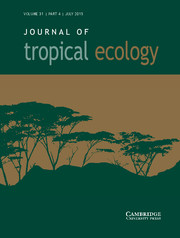Article contents
Toads (Bufo bankorensis) influence litter chemistry but not litter invertebrates and litter decomposition rates in a subtropical forest of Taiwan
Published online by Cambridge University Press: 05 March 2007
Abstract
Few studies have been conducted to investigate ecological roles of litter amphibians in forest ecosystems. In this study, ten field enclosures (3 m × 2 m × 0.4 m) were used to evaluate effects of the toad Bufo bankorensis on the abundance of litter invertebrates (microbivores, fragmenters and predatory arthropods) and litter decomposition rates in a subtropical forest of southern Taiwan. Litterbags collected from toad and control (toad-excluded) enclosures were analysed for the communities and abundances of litter invertebrates and decay loss during this decomposition study from September to December 2001. The presence of B. bankorensis significantly changed phosphorus concentrations in the litter, but not the densities of litter invertebrates (microbivores, fragmenters and predatory arthropods) or rates of litter decomposition. These results were not consistent with previous studies, which have shown that Plethodon cenereus in a temperate forest of north-east USA and Eleutherodactylus coqui in a tropical rain forest of Puerto Rico significantly changed decomposition rates. We suggest that ecological roles of ground-dwelling amphibians may be species-specific and vary with different terrestrial ecosystems.
Keywords
- Type
- Research Article
- Information
- Copyright
- 2007 Cambridge University Press
- 8
- Cited by


